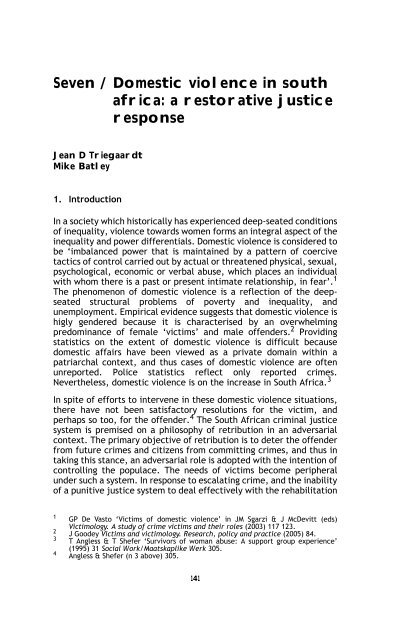Sex, Gender, Becoming - PULP
Sex, Gender, Becoming - PULP
Sex, Gender, Becoming - PULP
You also want an ePaper? Increase the reach of your titles
YUMPU automatically turns print PDFs into web optimized ePapers that Google loves.
Seven / Domestic violence in south<br />
africa: a restorative justice<br />
response<br />
Jean D Triegaardt<br />
Mike Batley<br />
1. Introduction<br />
In a society which historically has experienced deep-seated conditions<br />
of inequality, violence towards women forms an integral aspect of the<br />
inequality and power differentials. Domestic violence is considered to<br />
be ‘imbalanced power that is maintained by a pattern of coercive<br />
tactics of control carried out by actual or threatened physical, sexual,<br />
psychological, economic or verbal abuse, which places an individual<br />
with whom there is a past or present intimate relationship, in fear’. 1<br />
The phenomenon of domestic violence is a reflection of the deepseated<br />
structural problems of poverty and inequality, and<br />
unemployment. Empirical evidence suggests that domestic violence is<br />
higly gendered because it is characterised by an overwhelming<br />
predominance of female ‘victims’ and male offenders. 2 Providing<br />
statistics on the extent of domestic violence is difficult because<br />
domestic affairs have been viewed as a private domain within a<br />
patriarchal context, and thus cases of domestic violence are often<br />
unreported. Police statistics reflect only reported crimes.<br />
Nevertheless, domestic violence is on the increase in South Africa. 3<br />
In spite of efforts to intervene in these domestic violence situations,<br />
there have not been satisfactory resolutions for the victim, and<br />
perhaps so too, for the offender. 4 The South African criminal justice<br />
system is premised on a philosophy of retribution in an adversarial<br />
context. The primary objective of retribution is to deter the offender<br />
from future crimes and citizens from committing crimes, and thus in<br />
taking this stance, an adversarial role is adopted with the intention of<br />
controlling the populace. The needs of victims become peripheral<br />
under such a system. In response to escalating crime, and the inability<br />
of a punitive justice system to deal effectively with the rehabilitation<br />
1 GP De Vasto ‘Victims of domestic violence’ in JM Sgarzi & J McDevitt (eds)<br />
Victimology. A study of crime victims and their roles (2003) 117 123.<br />
2 J Goodey Victims and victimology. Research, policy and practice (2005) 84.<br />
3 T Angless & T Shefer ‘Survivors of woman abuse: A support group experience’<br />
(1995) 31 Social Work/Maatskaplike Werk 305.<br />
4 Angless & Shefer (n 3 above) 305.<br />
141
















